The nocturnal heroines drawing attention to the rising rates of femicide in France
Bertille Duthoit spends a night putting up posters with Collages Feminicide, a group forcing Parisians to confront the issue of women’s murder around the world
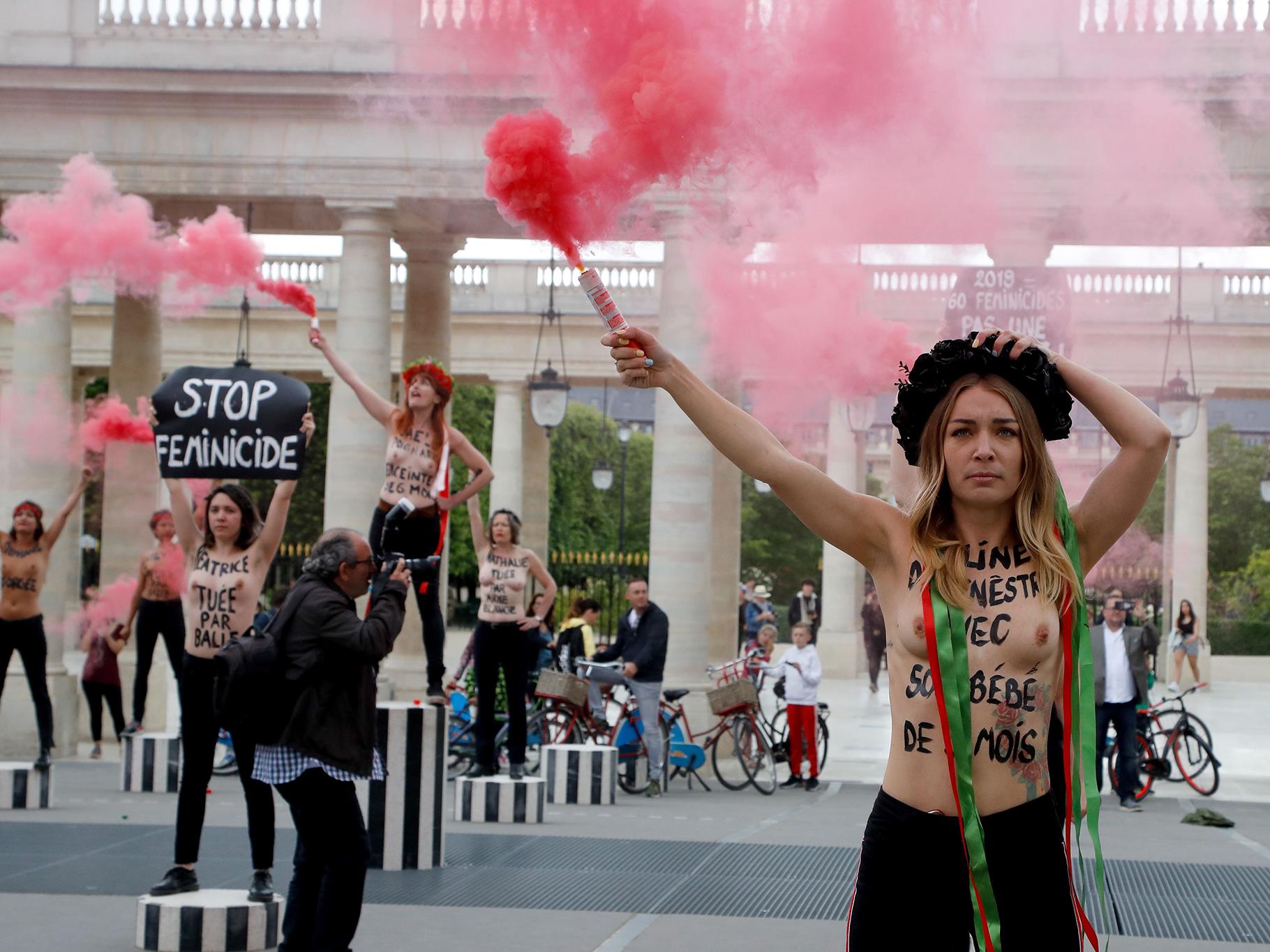
Meet us in front of the station, we’ll be making the glue,” is the text I receive from Jeanne, a student in Paris and a member of the feminist group Collages Feminicide. A group usually composed of 200-300 women in Paris, that tonight become three – four if you include me – on a mission to raise awareness for the ongoing femicide epidemic in France by tagging walls with slogans around the supposed city of love.
When I arrive, Jeanne is indeed making glue; it’s what we’ll use to stick up slogans they prepared at home: “Love ≠ Kill”, “She left him, he killed her”, “We never kill for love” or “Not one more” are a few that Parisians will read tomorrow morning while walking to work. This is not street art, they are not trying to spread love or any philosophical message as artists would do: they are together to denounce the crime of femicide – where a woman is murdered because she is a woman. In other words, it’s a sex-based hate crime.
Since January, 124 women have been killed by their partner; three more than in 2018. “The goal is that the government will provide funds to change these problems. But it’s also to alert the young and old to this issue and generate actions such as creating accommodation for women who can’t go home,” says Philomene, another student, who participates in the movement two nights a week. “It’s also for the charities who are working to change things. Some of them are just not heard. There are people with expertise who can provide statistics but no one hears them – or wants to listen. It’s absurd.”
While we march in the dark to stick black letters on the walls of Paris, it becomes clear that there are people around us know who we are. “It’s amazing what you’re doing! I’ve been following you for sometime now. How can I join?” asks a passerby, probably on her way home from a night out. “I’ll add you to the WhatsApp group,” Philomene shouts back, handing the woman her phone so she can add her number.
“The Collages Feminicide is not a small group. We are many,” Philomene tells me as we walk. If the nerve centre is in Paris, where there are around 300 activists, the movement is spreading across the length and breadth of France, and includes cities such as Bordeaux, Lyon, Grenoble, and Lille. It is crossing borders too, with Belgium and Switzerland joining the effort.
“It’s a phenomenon that is spreading. It’s not a niche movement, it’s something that concerns everyone,” she continues. “It’s a hive of activity. Hundreds of girls stick up names every night. The names are removed but the girls return and stick them up again. Honestly, almost every Parisian knows about us and our activities. We don’t want to count dead women anymore.”
If you go into the bourgeois and conventional areas such as the 16th or 17th arrondissement, you’ll find trouble. People don’t react well when you touch their Haussmannian building
Philomene joined the movement after seeing its Instagram and Twitter accounts. “When I realised how many women were killed, I was shocked. I knew that I could help, that I could do something, so I joined,” she says. And behind Philomene, an entire nation of women are up in arms. On 5 October, hundreds of women painted their skin with grey paint and walked towards the Montparnasse cemetery, representing each of the French femicide’s victims. These activists were part of the French feminist movement, Femen, adding their voices so things will change.
“Femicide is a hate crime,” one of the placards read. A Femen spokesperson pointed to the upsetting reality: “Before being killed, these women were victims of intra-familial violence and alerted the civil society, the police, the justice system, about the threats above their heads.”
At the time of the Femen march earlier this month, 114 women had been killed. By 19 October, less than a month later, seven more women had died. To highlight those high numbers, #NousToutes, another charity, organised five “die-ins” in Paris. Hundreds of women lay in the streets with the names of victims on their chests.
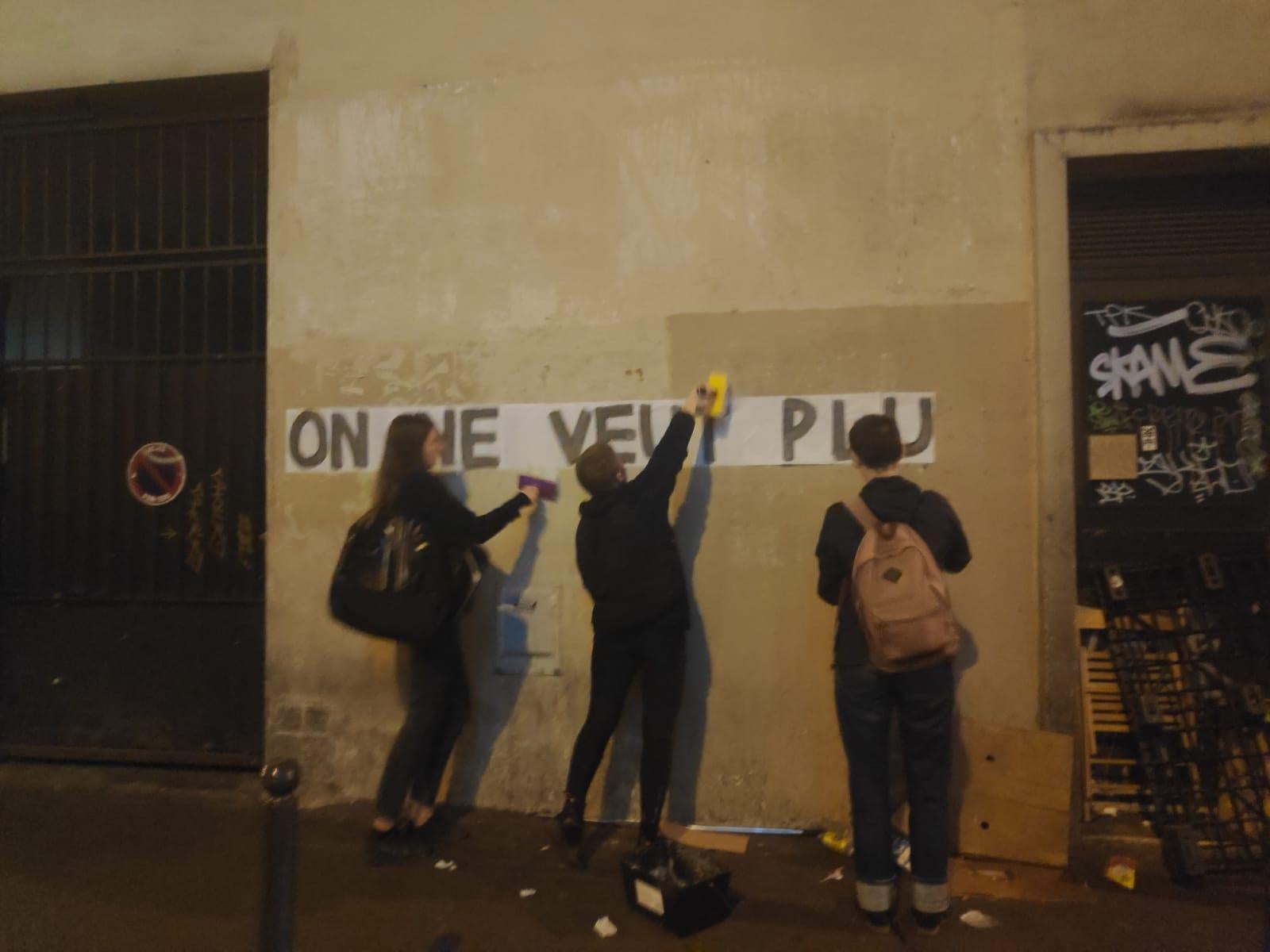
If these activists are working hard to make femicides a priority, it’s because the government and prime minister Edouard Philippe’s proposed reforms are not enough. “It’s time to give back to French women the freedom to live and breathe. It’s a huge emergency,” he said when his government launched a multi-party debate on domestic violence on 3 September. The consultation brought together MPs and charity representatives to exchange ideas and create reforms to help improve the situation. there were calls for a “Marshall plan”, which would put reforms into practice immediately to prevent further victims.
87,000
women killed intentionally each year globally
Since that meeting, some actions have been taken, such as the wide-scale use of electronic bracelets, worn by domestic violence victims, which prevent the offenders from approaching victims and allows the wearer to contact the police with their bracelet.
This new technology is not the only prevention measure that has been put into place. Philippe also promised to create 250 housing centres for women in crisis and 750 spaces for temporary accommodation (for six months). These places will be available from January 2020. But is this really enough?
In parallel, the “Catherine’s fund”, created by secretary of equality Marlene Schiappa, is slowly taking form with €1m in funding and the placement of 73 psychologists in police stations. Other reforms include the ability to press charges at the hospital or the loss of parental authority if one parent is violent. But these promises don’t convince the population or organisations such as Collages Feminicide, which, Philomene says, “will glue and glue” until they see “some real changes”.
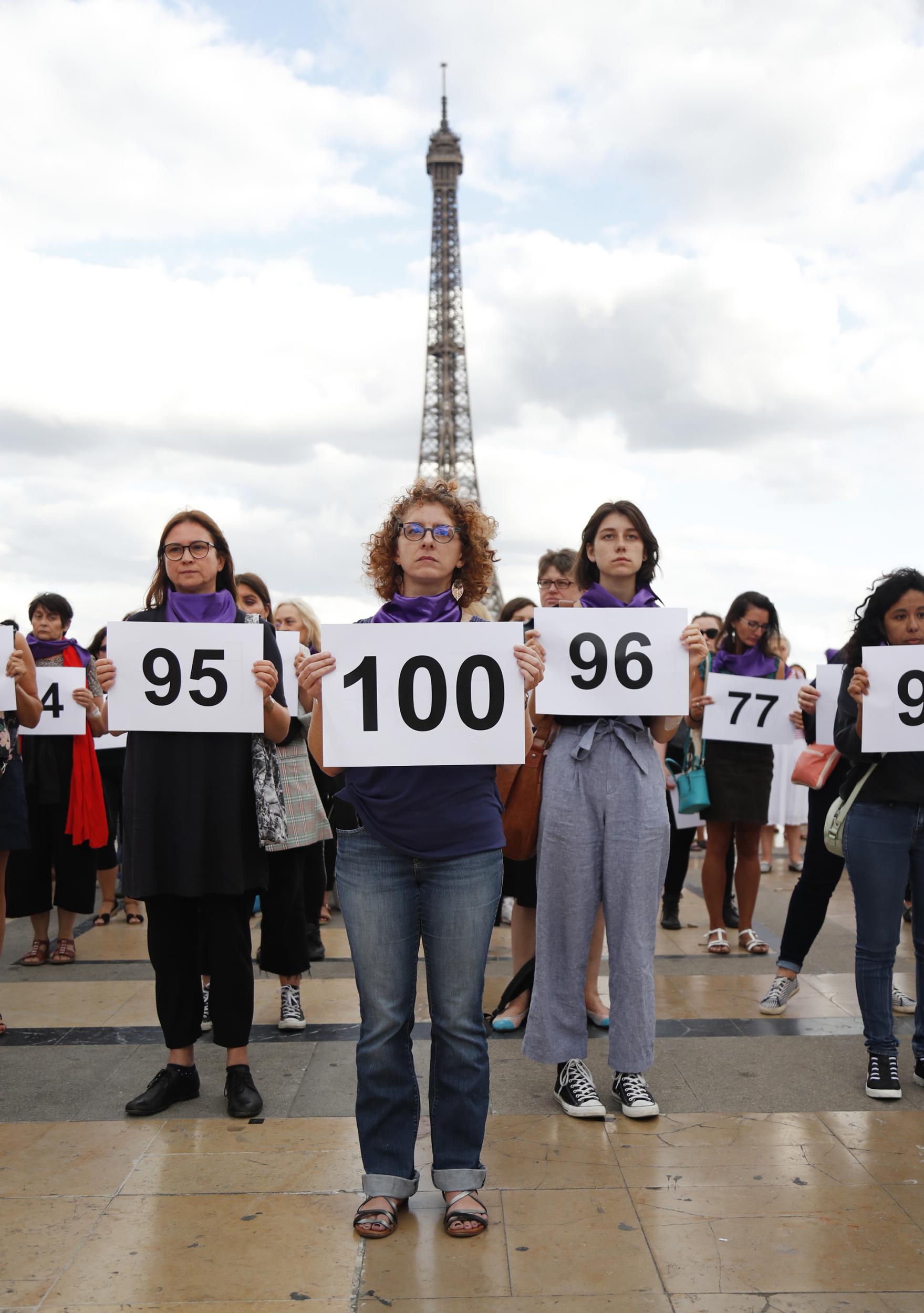
Jeanne tells me that Collages Feminicide was started in response to the promises made by the government. “At the beginning, it was easier. There was a general headquarters in Denfert, in Paris. It had to close down and now we’re organised by area; there are five of them.”
The glueing movement hit the Paris streets for the first time on 30 August, with just 40 people. The aim was to pay tribute to each victim who died from her partner’s punches. The design was always the same: name, date and circumstances of death such as “strangled”, “slaughtered”, “stabbed”. The goal was also to raise awareness of the extreme violence to which some women are exposed to in their own home, and rally as many people together to support victims.
But across France and the rest of Europe, the protests are sometimes met with disdain. “If you go into the bourgeois and conventional areas such as the 16th or 17th arrondissement, you’ll find trouble. People don’t react well when you touch their Haussmannian building,” Philomene explains
“One day, a 60-year-old woman didn’t agree with our message. We tried to explain to her what our mission was but it didn’t work and she told us to leave. After that, she removed the slogan we had just glued. But at least we raised awareness of femicide in her mind,” Jeanne adds.
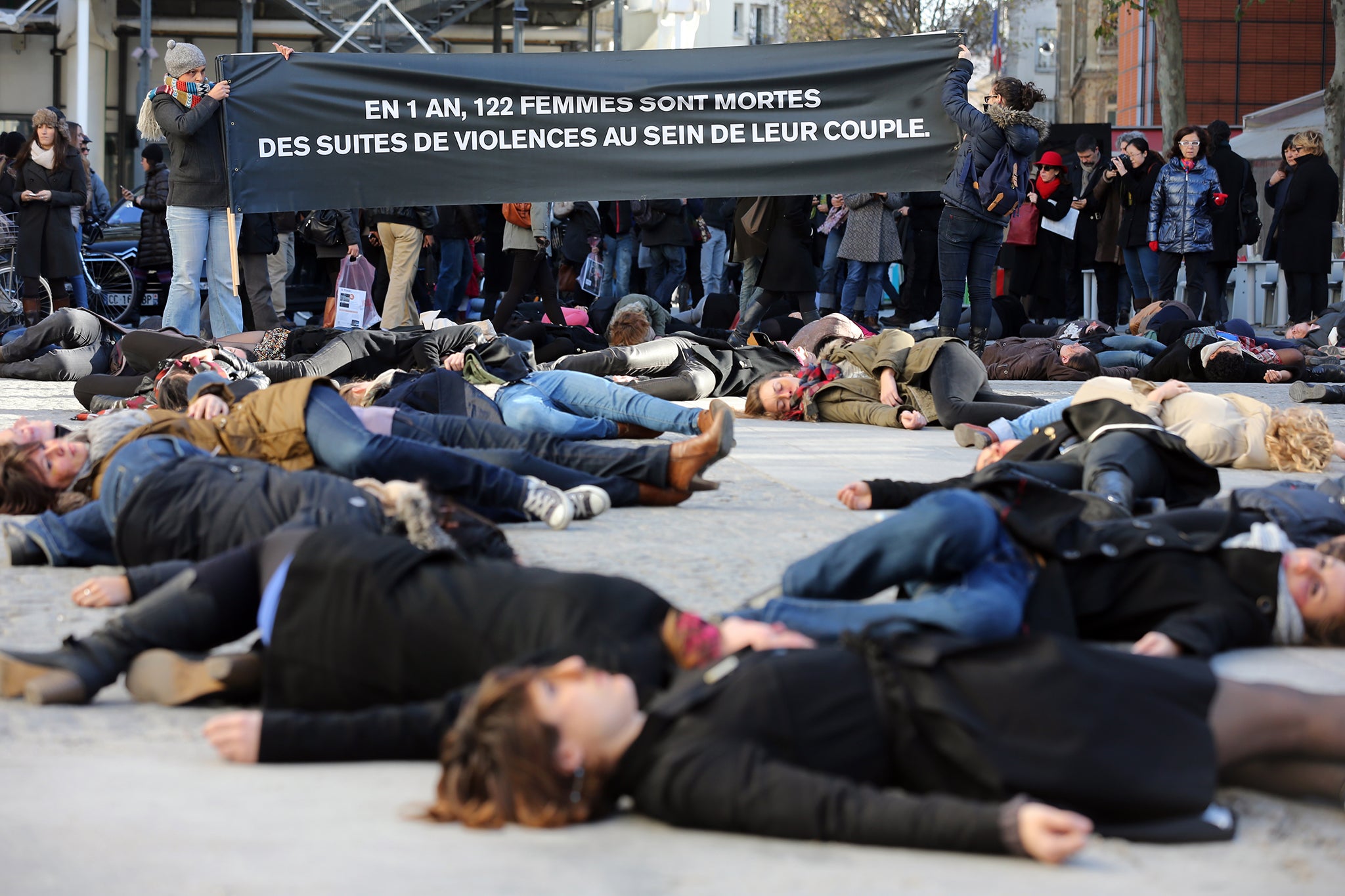
“It’s so exhausting. You spend all this time trying to make her change her mind and she just keeps saying, ‘I don’t have anyone who’s been affected’. Well, that’s great for you,” adds Philomene.
It’s a hive of activity. Hundreds of girls stick up names every night. The names are removed but the girls return and stick them up again. Honestly, almost every Parisian knows about us and our activities. We don’t want to count dead women anymore
According to the activists, people react this way because they “don’t like seeing the sad reality when they go to work in the morning”. Besides denial, there’s also an element of pure misogyny. “One guy said to us, ‘What you’re doing is ugly. Why are you doing that in our streets? How will people respect you if you don’t respect others? And after that, they complain when they’re given a slap.’ To be honest, all that did was make us realise there was still a lot of work to do,” says Jeanne.
“With strong slogans like the ones we’re sticking up tonight, we hope that some of them will pass by and see that they’re not alone. That they’re understood,” Philomene explains. But for her, the other most important group to target is the aggressors. By seeing these slogans, they are forced to face their own violence, as well as the power of solidarity. It might make them realise the impact of their actions and ask for help, and perhaps it will even stop them being violent. As Margaret Atwood said in her essay Second Words: “Men are afraid that women will laugh at them. Women are afraid that men will kill them.”
Around the world, almost 87,000 women are intentionally killed each year, according to a study by the UN. More than one in two of these victims are killed by a close relative or partner. As journalist Didier François said on French radio network Europe 1: “50,000 women are killed each year by a partner, a brother, a father or another close male relative each.”
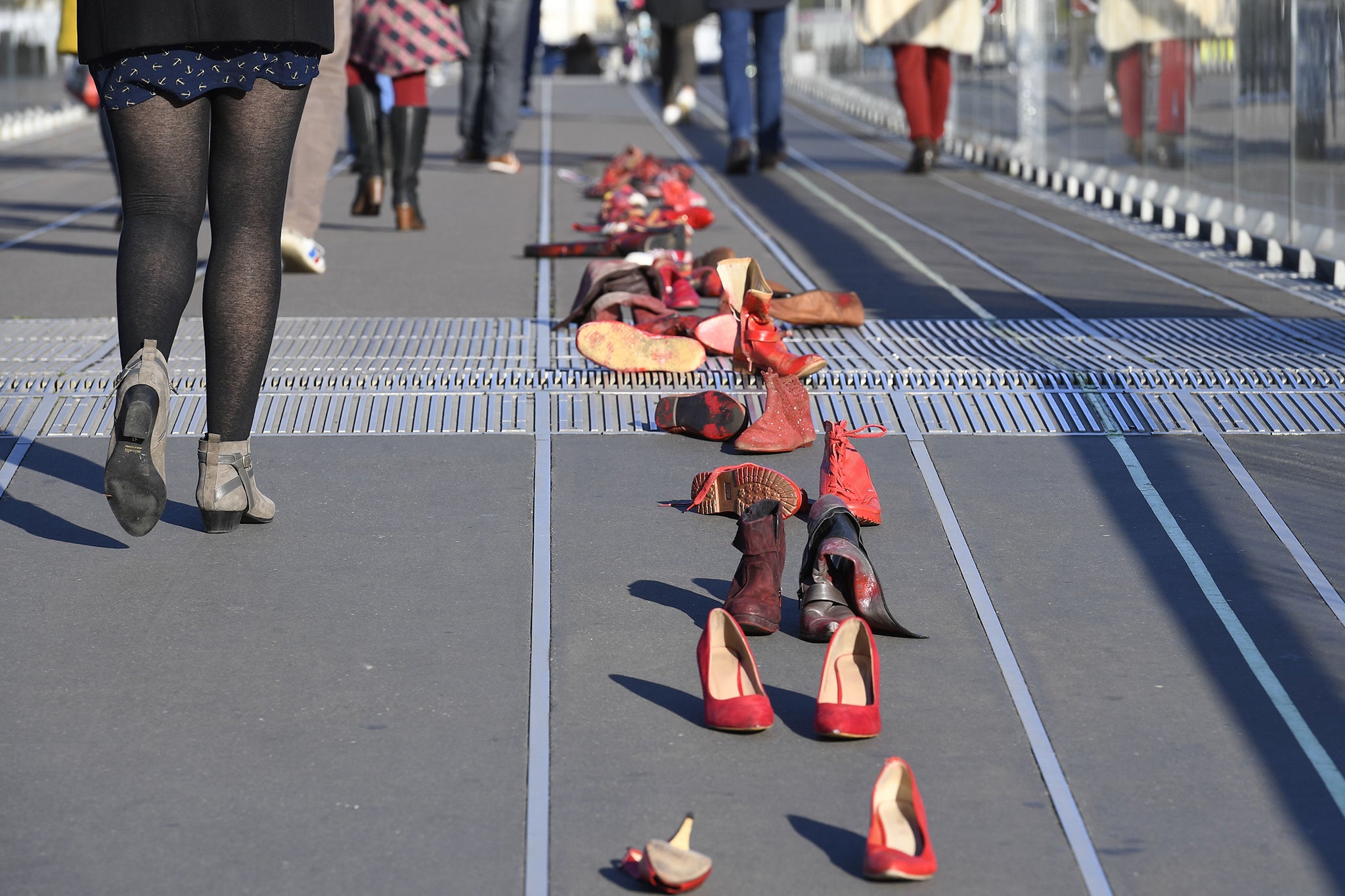
The numbers are daunting and show that femicide has become a global issue. According to the UN, the highest rate of femicide is in Africa. Eurostat, a directorate of the European Commission based in Luxembourg, ranks countries across Europe. Romania has the highest record of femicide cases, followed by Hungary, Finland, Latvia, Germany and France. In France today, femicide is a common word, even used by the prime minister. But in other parts of the world, it’s struggled to penetrate the lexicon. Its plurality of definition has been much written about but its general and most common definition would be a hate crime perpetrated by men against women because of their gender.
Philomene isn’t phased by this information. “Some people don’t know what femicide is. But, what we hope is that by seeing our collages they will become curious and type the word into Google. Just that action is a big step forward for us,” she says with a warm smile on her face. Safe to say, we’re all getting cold on this autumnal Paris evening, but that won’t stop us, I’m told.
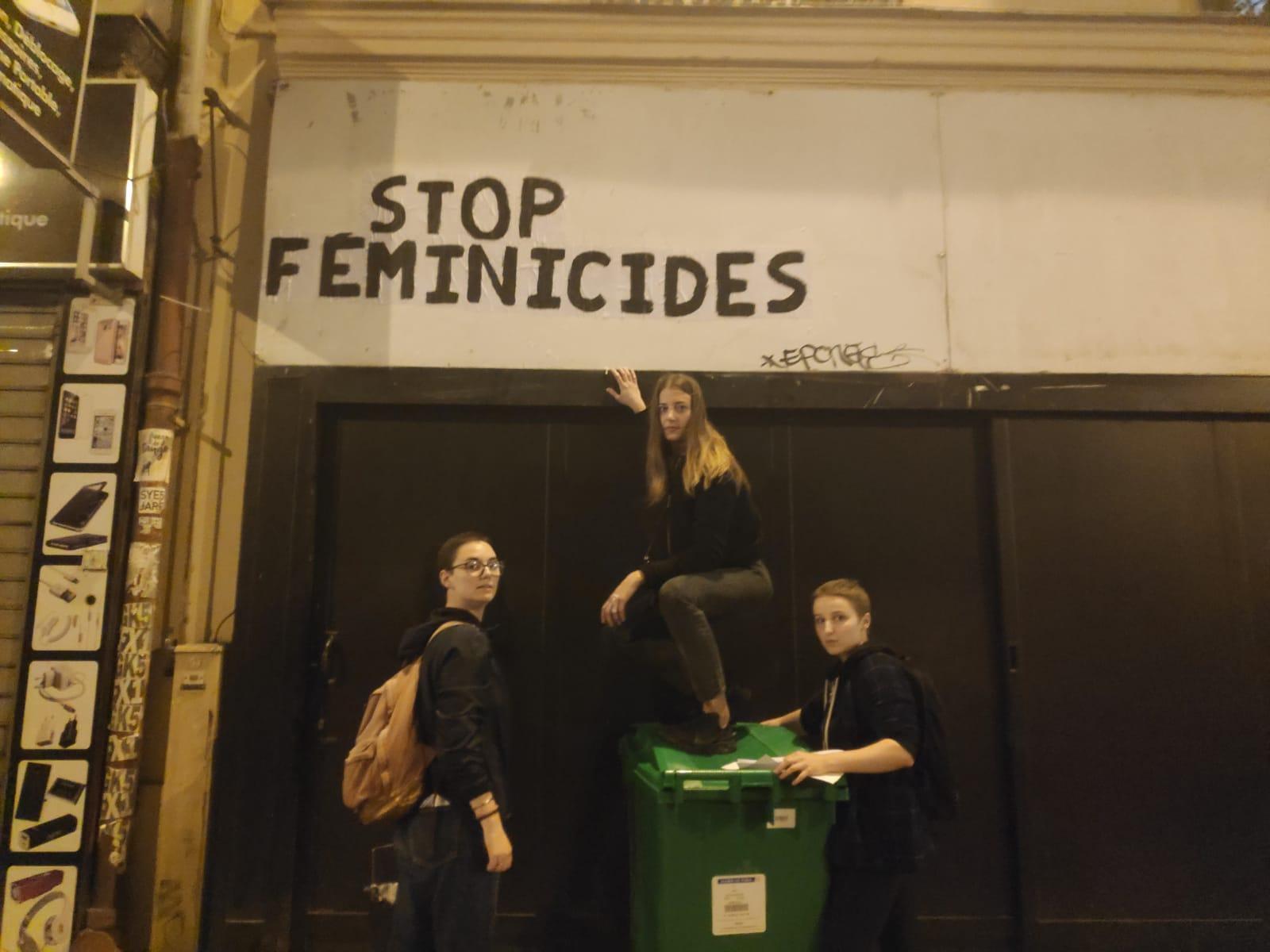
Of course, there are people who recognise the word and the issue for what it is: a disaster. “Can I take a picture?” shouts another 20-year-old woman on the street, who looks like she’s on her way to a club. “By the way, it’s incredible what you’re doing,” she adds, while putting the picture on her Instagram story. This support seems to cement the group’s desire to do more and keep fighting for the rights of women dying at the hands of men not just in France, but all over the world. Crucially, Collages Feminicide knows that it is not alone in the fight.
As we move on to our next location, Jeanne tells me about a woman who came up to her during a previous night-tagging excursion. She reassured Jeanne that the work she was doing was important and would help many people. It turned out the woman belonged to a charity for female victims of domestic violence, to help them start over and gain confidence. “When you hear that, you know that you’re not useless and that what you are doing matters. It feels good,” she says.
While she has never had to endure domestic violence, Jeanne says some of the girls who work with Collages Feminicide have. “We meet and work with people who are in abusive relationships. I know that some of them are here for that, to free themselves from violence and pain but also to support each other,” says Jeanne. “That is why we decided to translate some of our slogans in different languages, so every woman in the street can feel supported even if they are tourists,” she adds.
The third member of the group, a pharmacist named Juliette, who has kept herself busy as we’ve made our way around the city, suddenly spots a wall with good exposure. “We have to find a way to glue here,” she shouts at us. “No, it’s impossible, we would need a ladder and if the police come we’re screwed,” says Philomene.
But it seems Juliette has made up her mind: she takes a bin, rolls it near the wall and asks me to hold it. “If you help me, this will be the best one we’ve ever done.”
“OK let’s do it,” we say. Two minutes later, Juliette resembles some kind of Marvel-esque superhero, as she stands strong on the bin – slogan glued on to the wall. “Stop femicides” in huge unmissable letters. “People tomorrow morning won’t miss this – everyone will face our words, I think we’ve done our duty for tonight,” Philomene says. And like that, we slip off into the night… only glue and courageous slogans left to prove we were ever there.
Join our commenting forum
Join thought-provoking conversations, follow other Independent readers and see their replies
Comments